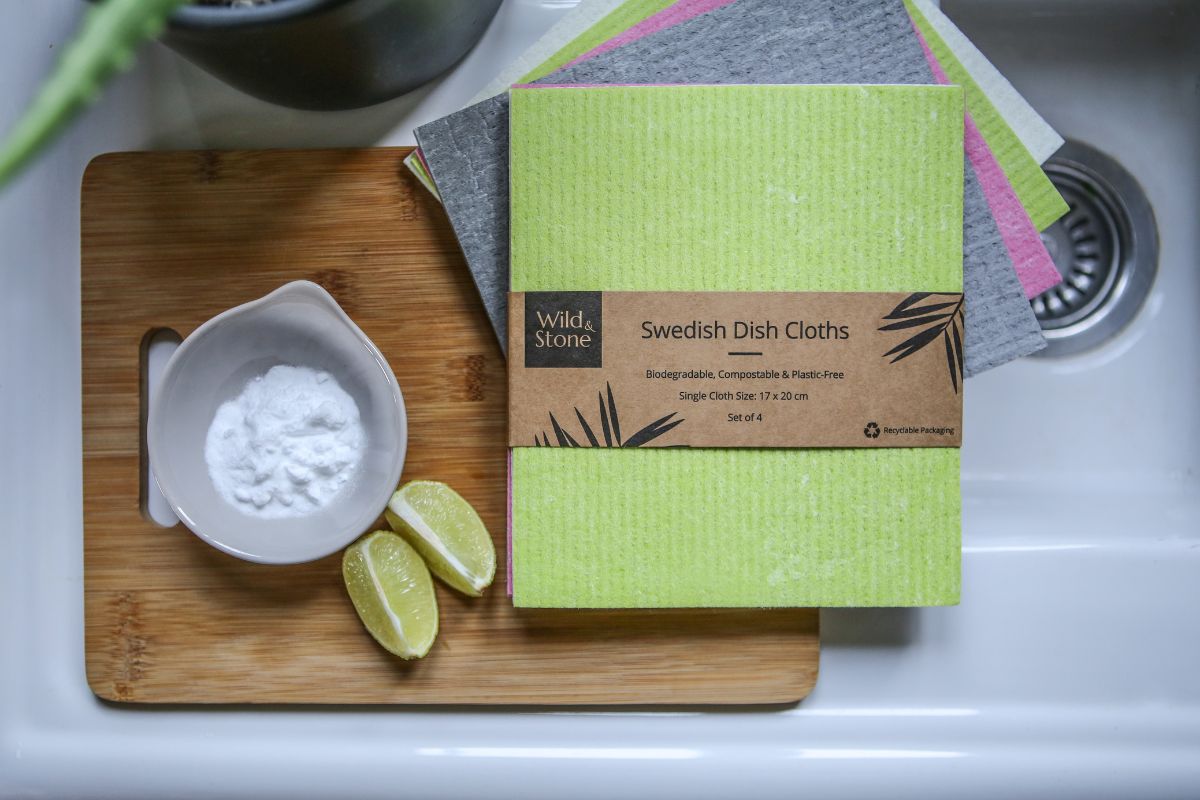Your Cart is Empty
INFO

Sustainable Spring Cleaning Tips
March 30, 2023 5 min read
Spring has arrived! And with it, the annual spring clean. If you haven’t experienced this cultural tradition, spring cleaning is the act of thoroughly cleaning a room or your entire home at springtime. It’s considered the best time of year to start afresh; after all, Spring (and Easter) is all about new beginnings and hope for what’s to come. In this article, we cover its benefits and our top sustainable spring cleaning tips.
Spring Cleaning Benefits
By helping you to create a clean and decluttered space, spring cleaning has a number of benefits for your physical and mental health.
- Strengthens Immune System: a clean house can help you to breathe better, preventing respiratory issues and supporting a healthy immune system.
- Prevents Allergies: an unclean house can gather pollutants, such as dust, mould and pet hair, which can trigger allergies.
- Improves Mental Health: research suggests that an unclear or cluttered space can lead to stress and depression. In addition, clutter can make it difficult to focus on a particular task, which is not ideal if you work from home.
- Reduces Injury Risk: a cluttered home can increase your chance of injury. To prevent bumps, scratches and falls, ensure that high traffic areas and walkways are clear.
- Deters Pests: as you can imagine, bugs and rodents love a messy home. Cleaning and sanitising your space will deter them, as well prevent the spread of bacteria and disease.
- Find Lost Items: you’ll be surprised at how many items you have misplaced or lost turn up when you spring clean.
The one downside of spring cleaning is that lots of the products and practises we use to clean aren’t good for the planet. From toxic chemicals in our cleaning products to single-use wipes that end up in landfill, our efforts can do more harm than good. The good news is that there are methods you can use to spring clean your home in a manner that is sustainable for both you and the environment.
Sound good? To help you get started with the big clean, we’ve compiled our top sustainable spring cleaning tips.
1. Use Natural Cleaning Products
From natural bleach to a beechwood toilet brush, there are tonnes of natural cleaning products out there — many of which are refillable. Not only are these better for human health and the environment, they are kinder to our surfaces and possessions too. Just check product labels for terms like biodegradable, recyclable and non-toxic.
Although natural cleaning products might have an initial higher cost, lots of green "costs" are actually investments — it's possible to be eco-friendly on a budget and save money in the long term.
For example, compostable dish cloths are the perfect alternative to single-use cloths. They’re reusable, washable and designed to last, and once you’re done with them, you can cut them into strips and place in the compost bin.

Alternatively, you can make your own cleaning products and upcycle existing items (such as old toothbrushes) to get the job done. Vinegar, salt, lemon and sodium bicarbonate are all effective, plastic-free cleaning tools.
2. Air Dry Clothes & Textiles
Spring means more sunshine and longer days. Take advantage of this and air dry your clothes and textiles on the washing line, or on an airer with the windows open.
Why? Machine drying clothes accounts for 75% of laundry’s total carbon footprint, whereas air-drying your clothes as part of a sustainable laundry routine can help reduce climate impact by 67%. By drying our clothes outside, we also keep them fresh and free from musty smells.
You get bonus points if you use bamboo clothes pegs instead of plastic ones.
3. Recycle, Donate or Sell Unwanted Items
When you’re going through your cupboards, drawers and wardrobes, don’t just chuck unwanted items in the general waste bin.
Instead, create separate piles for different types of item: donate, sell, recycle or bin. The first three will give your old items a new lease of life, and prevent otherwise useful objects going to landfill.
4. Go Paperless
Nobody is a fan of junk mail. If you’re sorting through piles of letters to recycle, take a moment to note down which mail isn’t benefiting you, so you can unsubscribe and stop receiving it. This is beneficial for the planet, and helps prevent clutter from building back up.
On the same note, if you’re organising more important paperwork (such as bank statements or payslips), consider going paperless. Most companies offer the option to get your statements and correspondence online, in order to save paper.
5. Commit to Composting
Composting food scraps or leftovers is a great way to reduce waste in the kitchen and turn what would otherwise be waste into nutrient-rich soil. When you're clearing out your fridge, cupboard or pantry then, compost expired food and donate in-date food that you don't want to a local food bank.
And make this a habit! Spring cleaning isn't just a one-time clean, it's also about setting better habits for the months to come.
6. Encourage Energy Efficiency
From sealing windows to fixing that leaky faucet, now is the time to complete those small jobs that have a big impact on your energy use.
Work out anywhere that you're losing out, and make a checklist to tackle them as part of the spring cleaning period. This might include insulating unheated areas, draught proofing gaps, sealing between floorboards and replacing inefficient appliances — though this will depend on your place.
7. Use a Natural Air Freshener
Conventional air fresheners contain harsh chemicals that can impact indoor air quality by adding potentially hazardous pollutants to the air. Instead, you can use a natural alternative to refresh your home.
Air Freshener Alternatives
- Essential Oil Diffusers: natural deodorizers, available in a range of scents, including lavender, lemon, grapefruit and bergamot.
- Natural Candles: made with coconut or soy wax, and scented with essential oils.
- Boiled Lemon Peels: for a fresh clean scent using leftovers. You could also use orange rinds, apple peels or herbs and spices.
- Flowers: whether store-bought or grown in your garden, a fragrant bunch of flowers (or sprigs) can freshen up your home.
- Air Purifying Bag: naturally absorbs odours and freshen the air.

8. Reduce Water Usage
Rather than running the tap when you need water to clean with, fill up a bucket to save water and use the "used water” to water plants. You should also only run your dishwasher and washing machine when it's full.
For longer term water savings, as well as making those energy-saving repairs mentioned above, you should install low-flow toilets and flow-regulated shower heads to reduce water consumption and lower your energy bills.
Most of us will do at least a little bit of spring cleaning this year. Use this as an opportunity to get ahead and make changes that ensure yours is as sustainable as possible.
—
Wild & Stone's mission is to create stylish, easy to adopt and usable alternatives to common plastic products around the home. We source all our products sustainably, from raw material to final delivery. Shop our full range of home and lifestyle products on our website, or get more tops over on our sustainable living blog.
Share your plastic-free swaps with us at hello@wildandstone.com or tag us on Instagram #wildandstone.
Also in Sustainable Living Blog

8 Tips for a Sustainable Commute
June 29, 2023 5 min read
The way you get to work can have a huge impact on your carbon footprint, and both you and your employer play an important role in encouraging a greener commute. Learn more here.
Read More
Eco-Friendly Beach Essentials
June 22, 2023 4 min read
By making more conscious choices, we can enhance our beach trip while minimising our environmental impact. In this blog post, we'll explore the top eco beach essentials for your next trip.
Read More
Eco-Friendly Summer Activities for Summer 2023
June 15, 2023 4 min read
From walks on beautiful coastlines to events hosted in your own garden, make the most of the good weather and time spent with your loved ones with these eco-friendly summer activities.
Read MoreMake your inbox a little more eco!
Sign up and save 10% on your first order of 2 items or more.
Keep an eye on your inbox for the latest eco trends, articles, deals and product releases.


